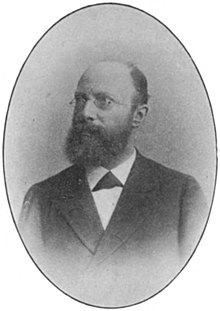Pieter Lodewijk Muller
Pieter Lodewijk Muller (born November 9, 1842 in Koog aan de Zaan in today's Zaanstad , † December 25, 1904 in Gardone Riviera ) was a Dutch historian .
Life
Pieter Lodewijk Muller was born the third son of Christiaan Muller and Isabella de Cercq. The father was a predicant of the Mennonites in the North Holland communities Koog and Zaandijk, the mother came from a wealthy Dutch family and died when Pieter was two years old. The Mullers, who formerly spelled themselves Müller, were of German descent; Pieter's grandfather Samuel and his great uncle Johannes came to Amsterdam from Krefeld around 1800 to set up shop in the book trade . The uncle was Frederik Muller, a bookseller and publisher known in Amsterdam to this day.
Muller attended the village primary school in Koog and switched to the French school in Zaandijk at the age of nine. From 1861 to 1867 he studied philology and history at the University of Leiden , focusing specifically on Dutch history of the 17th century and the Dutch Golden Age , a subject that was to remain his main focus throughout his life.
In December 1867 he received his doctorate with a dissertation on Geschiedenis der regering in de nader geunieerde provincien 1579−85 (Leiden 1868) and then went to Brussels to work for a few months as a correspondent for the Spanish envoy. He then went on an almost one-year study trip to Berlin, Dresden, Vienna and Heidelberg, from which he returned in April 1869. Now he settled in Haarlem , where his father now lived, and worked as a teacher at the Gymnasium in Leiden.
In 1874 he married Dorothea (Dora) Bohn (* 1846), the daughter of the publisher Pieter François Bohn and the writer Dorothea Petronella Beets, and took a temporary position as a temporary clerk at the Rijksarchief in The Hague , which he held until 1877.
In 1878 he received the chair for Dutch history at the University of Groningen , which he held until 1883. On October 5, 1883, he moved to the University of Leiden . In 1902 a severe lung disease forced him to give up his teaching job, and he spent the winter on Lake Garda for climatic reasons. In early 1903 he appeared to have recovered enough to return to work, but the disease recurred a few months later and he returned to the south. He died in Gardone Riviera on Christmas 1904.
Muller's scientific merits mainly concern research into recent Dutch history; his extensive writings on the 17th century became the standard work, his publication Republic der Verenigte Nederlanden in haar bloetijd (The Republic of the United Netherlands in its heyday) coined the term for this epoch of the Golden Age of the Netherlands, since its publisher used the original Title expanded to include Onze gouden eeuw (our golden age) from the second edition .
Works (selection)
- Onze gouden eeuw: de republiek der Vereenigde Nederlanden in hair bloeitijd geschetst (1883/1897)
- Regesta Hannonensia (The Hague 1882)
- De Unie van Utrecht (Utrecht 1878)
- Wilhelm of Orange and Georg Friedrich von Waldeck (1873–80)
- De Staat der Vereenigde Nederlanden in de jaren zijner wording (1572–1594) (1872)
- Nederlands eerste betrekkingen met Oostenrijk (1870)
- Hugo Grotius as a Latin poet (1867)
- De geschiedenis der Regeering in de Nader Geunieerde Provinciën tot aan de komst van Leicester (1579–1585) (Dissertation 1868)
Muller has also written numerous papers on Dutch history in magazines.
Web links
- http://www.digitallibraries.org/tekst/bran038biog01_01/bran038biog01_01_2855.htm
- http://www.digitallibraries.org/tekst/_jaa003190501_01/_jaa003190501_01_0024.htm
- [1] Herman Theodoor Colenbrander : Pieter Lodewijk Muller (1883-1904) (Extensive, detailed biography, Dutch)
| personal data | |
|---|---|
| SURNAME | Muller, Pieter Lodewijk |
| BRIEF DESCRIPTION | Dutch historian |
| DATE OF BIRTH | November 9, 1842 |
| PLACE OF BIRTH | Koog aan de Zaan in today's Zaanstad |
| DATE OF DEATH | December 25, 1904 |
| Place of death | Gardone Riviera |
